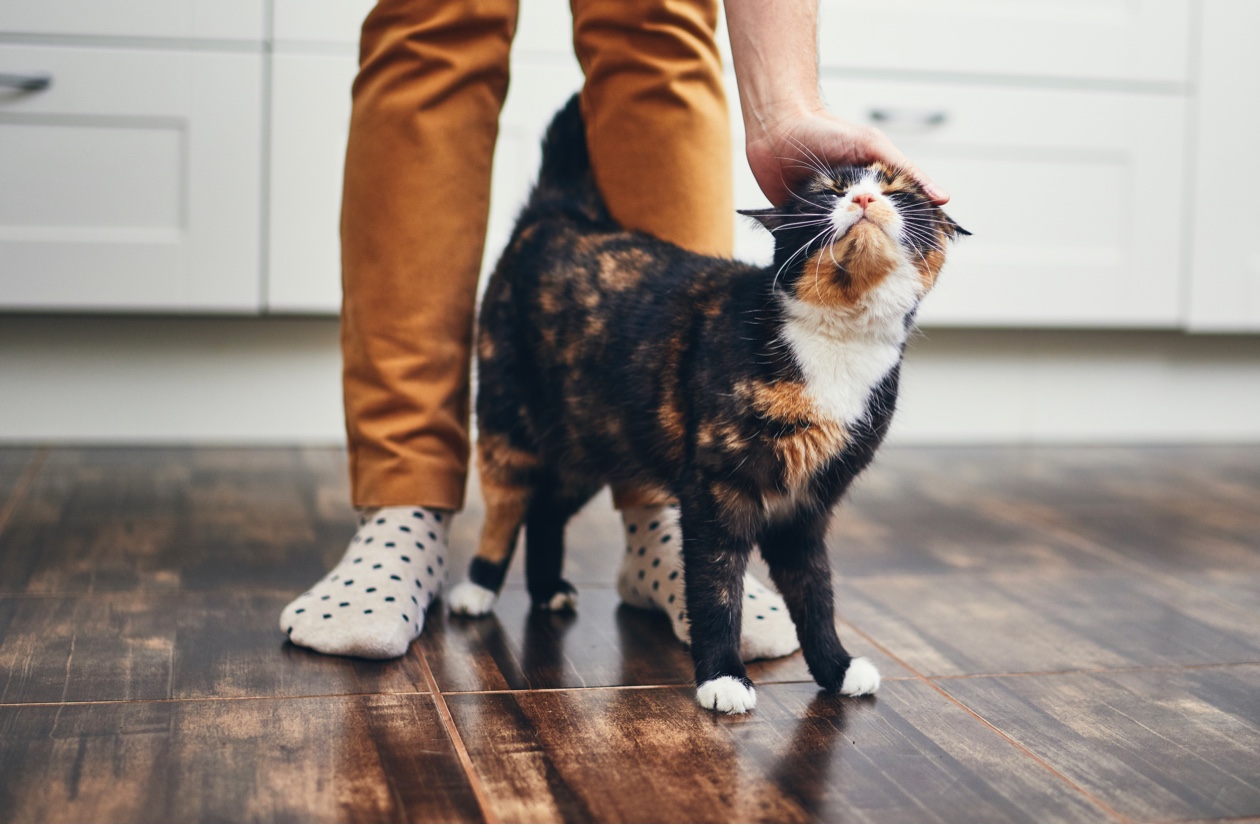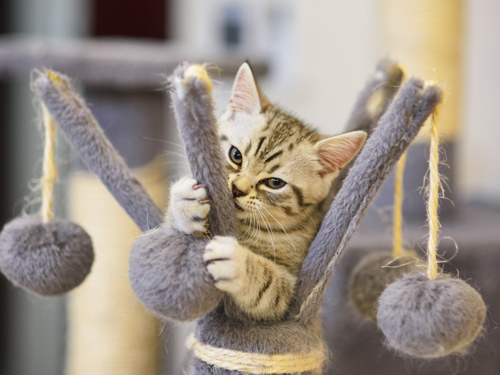
Most common cat behaviours explained
It can be difficult to know what is going on in your cat’s head sometimes – but learning how to interpret their behaviour could help give you a bit of an insight. Get to know your feline friend better with our handy guide to common cat behaviours.
Published:21 January 2025
How to cope with common cat behaviours
If your cat is a little fussy, occasionally destructive and sometimes unpredictable, don’t worry. Our handy guide will help you understand what your cat’s behaviour means and how to deal with it – whether it’s discouraging bad behaviour in kittens or persuading older cats to respect your house rules.

1. Hunting
Cats love to hunt - some outdoor cats may even bring home small birds or rodents as ‘presents’ for you. Animal lovers might find this a bit distressing but don’t get annoyed or angry at your cat – they are simply following their natural instincts.
To put a stop to those unwanted gifts, give them a collar with a small bell attached. This will help scare off prey. Also try keeping them indoors at dawn and dusk, when wildlife is most active.
Another little help: Some cats like to hunt more than others. Have a look at our pet breeds guide to see if you’ve got a natural hunter on your hands.
2. Litter tray problems
Sometimes cats will decide they don’t want to use their litter tray and a fresh round of toilet training is needed. Common reasons for toilet troubles include a dislike of the litter tray or cat litter being used, discomfort about the tray’s placement or conflict with other cats in the house. If your cat has stopped using their litter tray you should try:
- Moving the tray to a different location
- Switching to a different kind of cat litter
- Changing the litter regularly
- Providing an extra litter tray if you have more than one cat
- Removing the lid or hood if your tray has one – it might be making your cat uncomfortable
Cats can also suddenly stop using their litter tray if they are unwell with illnesses such as urinary tract infections or kidney problems. If none of solutions listed above help, be sure to pay your vet a visit.
3. Spraying around the house
Although frustrating for owners, spraying is a normal and natural cat behaviour. Cats spray to leave a ‘scent message’ and mark their territory.
Neutering your cat can help reduce spraying but it’s also worth considering whether there are any underlying reasons for this behaviour. Lots of cats spray excessively when they’re stressed out or in competition with other cats. If you have more than one cat you should ensure each cat has their own bed and a private space where they feel safe.
4. Meowing and crying
Some meowing is perfectly normal – it’s your cat’s way of communicating with you.
Over time you will get a feel for your cat’s personality, and learn to interpret what their meowing means. If they meow ahead of dinner time, it could mean they’re getting impatient for food, or if they meow near a door, they might want you to open it.
If you feel your cat’s meowing is becoming excessive or is a sign of distress, you should pay your vet a visit to rule out any underlying health issues.
5. Fighting and aggressive behaviour
Like humans, cats don’t always get on with their neighbours. Territorial disputes or a fight over a mate can result in aggressive behaviour. Neutering can help reduce fighting and aggressive behaviour in cats.
If you have more than one cat at home and find they fight a lot, give them separate food and water bowls, litter trays and beds. You should also reward them when they get along.
If your cat gets into fights regularly, your vet costs could soon mount up. Find out more about the kind of treatments pet insurance might cover on our website.
6. Scratching furniture and carpets
It can be easy to get annoyed with your cat when they claw or scratch your furniture and carpets - but your cat is only doing what comes naturally. Scratching is a way for cats to mark their territory, strengthen their muscles and sharpen their claws. To save your furniture, set up a sturdy scratching post that’s tall enough for your cat to stretch out fully, and reward them when they use it.
7. Biting and scratching
If your cat starts biting and scratching all of a sudden it could be a sign they’re unwell or in pain. Make an appointment to see a vet if you notice a change in your cat’s behaviour. Cats who are regularly aggressive don’t always understand that their behaviour isn’t acceptable.
The best way to get the message across, is to withdraw attention if they swipe or bite. Reward calm behaviour with treats and avoid shouting at them – this could just make the problem worse.
Another little help: Cats can sometimes lash out when anxious. When new people come round, encourage them to let your cat get used to them before they try to pet them or play with them.
Looking for more information?
Tesco Pet Insurance includes vetfone
Get advice for your pet, whenever you need it. Just call the vetfone helpline.
- Talk to vets and nurses registered with the Royal College of Veterinary SurgeonsTalk to vets and nurses registered with the Royal College of Veterinary Surgeons
- 24/7 phone, live chat and video calls24/7 phone, live chat and video calls
- Unlimited access, at no extra costUnlimited access, at no extra cost
Important information
Tesco Pet Insurance is arranged, administered and underwritten by Pinnacle Insurance plc. Tesco Personal Finance Ltd acts as an introducer to Pinnacle Insurance plc which is authorised by the Prudential Regulation Authority and regulated by the Financial Conduct Authority and the Prudential Regulation Authority (register number 110866). Registered Office: Pinnacle House, A1 Barnet Way, Borehamwood, Hertfordshire, WD6 2XX. Tesco Personal Finance Ltd and Pinnacle Insurance plc are not part of the same corporate group.
Vetfone is provided by Vetsdirect Ltd.
Tesco Insurance is a trading name of Tesco Personal Finance Ltd, Registered Office: 2 South Gyle Crescent, Edinburgh, EH12 9FQ (registered in Scotland, no SC173199) which is authorised and regulated by the Financial Conduct Authority (register no. 186022).
We do not provide personal recommendations to customers.
The content on this page aims to offer an informative introduction to the subject matter but does not constitute expert advice specific to your own situation. All facts were correct at time of publication and were compiled using a range of sources.